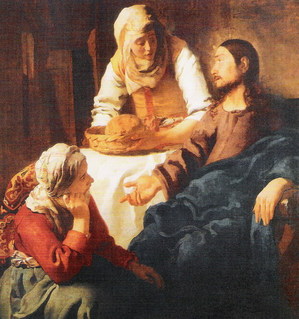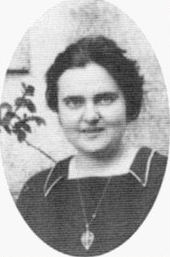A Little Bit of All the Virtues

Friday of the First Week of the Year I
Hebrews 4:1-5, 11
Psalm 77: 3 & 4bc, 6c-7, 8
Mark 2:1-12
Toil and Rest
There is a paradox in today’s reading from the Letter to the Hebrews. On the one hand, we enter into the Sabbath-rest of God by means of toil, i.e. the active life; and on the other hand, every work of ours is ordered to rest in God, i.e. the contemplative life. The Fathers of the Second Vatican Council made this clear in Sacrosanctum Concilium:
It is of the essence of the Church that she be both human and divine, visible and yet invisibly equipped, eager to act and yet intent on contemplation, present in this world and yet not at home in it; and she is all these things in such wise that in her the human is directed and subordinated to the divine, the visible likewise to the invisible, action to contemplation, and this present world to that city yet to come, which we seek ” (SC, art. 2).
Six days of work preceded God’s holy Sabbath. The world and all it contains was created for man and given to him in view of his participation in the Sabbath-rest of God. “God saw everything that He had made, and found it very good” (Gen 1:31).
The Active life
Saint John Cassian calls the labor by which we enter into God’s rest the active life. The active life engages us in the disciplines by which, sustained by a constant flow of actual graces, we dispose ourselves for the Work of God in us by doing whatever we can to uproot our vices and cultivate the virtues.
God works in us while we are at rest: still, quiet, and abandoned to His purifying and healing action. The psalm says, “Is it not in the hours of sleep that the Lord blesses the man He loves?” (Ps 126:2). Sleep is an image of confident repose in God. “Bear me witness that I kept my soul ever quiet, ever at peace. The thoughts of a child on its mother’s breast, a child’s thoughts were all my soul knew” (Ps 130:2).
The Christian life is not, however, all repose; those who hold that fall into the heresy of quietism. Nor is it all works; those who hold that fall into the heresy of activism, a misguided self-reliance condemned by Pope Leo XIII in his encyclical excoriating the errors of Americanism. Our Lord says, “Apart from me you can do nothing” (Jn 15:5). And in the same Gospel of Saint John he says, “Walk while you have the light of life” (Jn 12:35).
What Must I Do to Be Saved?
The classic question asked of the Desert Fathers was this: “What must I do to be saved?” The sense of the question is this: “What must I do to be saved by God?” and not, “What must I do to save myself?” Abba John answered the question, saying:
I think it best that a man should have a little bit of all the virtues. Therefore, get up early every day and acquire the beginning of every virtue and every commandment of God. Use great patience, with fear and long-suffering, in the love of God, with all the fervour of your soul and body. Exercise great humility, bear with interior distress; be vigilant and pray often with reverence and groaning, with purity of speech and control of your eyes. When you are despised do not get angry; be at peace, and do not render evil for evil. Do not pay attention to the faults of others, and do not try to compare yourself with others, knowing that you are less than every created thing. Renounce everything material and that which is of the flesh. Live by the cross, in warfare, in poverty of spirit, in voluntary spiritual asceticism, in fasting, penitence and tears, in discernment, in purity of soul, taking hold of that which is good. Do your work in peace. Persevere in keeping vigil, in hunger and in thirst, in cold and nakedness, and in sufferings.
Abba John’s sagacious reply is very similar to Chapter Four of the Rule of Saint Benedict: The Instruments of Good Works. All of these “instruments” or “practices” are the toil of the active life by which we “strive to enter” into the rest that God has prepared for us, “walking while we have the light of life.” And even when we fail miserably in putting the first 72 of Saint Benedict’s “instruments” into practice, there remains still one — the 73rd — and it is the most important one of all: “And never to despair of God’s mercy.”
Toward the Most Holy Eucharist
Everything we do by way of toil, mortification, and active virtue is nothing more than a humble preparation for the Work that, in all the sacraments, in the Divine Office, and supremely in the Holy Sacrifice of the Mass, God does in us and for us. The Church herself suggests this by commanding us to fast before Holy Communion. Every act of self-denial, every refusal to judge another, every effort of ours in the daily spiritual combat, however small, has a Eucharistic finality. The ascetical life is ordered to a transforming and fruitful participation in the sacramental grace of the Holy Sacrifice. There, all that we cannot do of ourselves and by ourselves, is given to us superabundantly. “My grace is enough for thee,” says the Lord, “my strength finds its full scope in thy weakness” (2 Cor 12:9). It is in this spirit that I often say the inspired prayer of Mother Yvonne-Aimée of Malestroit:

O mon Jésus,
faites en moi tout ce que vous voulez trouver
afin que vous puissiez tirer de mon néant
tout l’amour et toute la gloire
que vous aviez en vue en me créant.
O my Jesus,
do Thou in me whatsoever Thou desirest to find in me,
so as draw out of my nothingness,
all of the love and all of the glory
that Thou hadst in view in creating me.
“Humble Access”
We come to Holy Mass battle-scarred and weary. And we come to the altar not by great leaps and bounds, but humbly, by bowing low, striking our breast, and taking little steps. In the mysteries of His adorable Body and precious Blood, Our Lord fulfills His promise to us in a way surpassing all our imaginings: “Come to me all you that are weary and are carrying heavy burdens, and I will give you rest” (Mt 11:28).

“We come to Holy Mass battle-scarred and weary.”
That’s how I look when I get to the pews on Sundays. I couldn’t even bear small-talk until after I leave church.
Thank you, Father Mark, for this entry. Have a great week!
This was so amazingly helpful. So many of your reflections have been a balm and a tonic for me!
I give thanks that this gift you have is a gift from God, not just a human work and I pray you continue faithful and humble in His service, in the arms of Mary.
Would you mind telling me what Scripture translation you are quoting from, its really lovely.